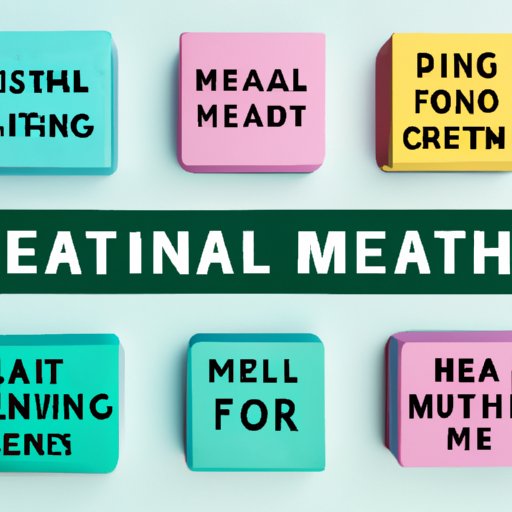
I. Introduction
Mental health is a crucial aspect of overall well-being yet sometimes overlooked. Taking care of your mental health is just as important as taking care of your physical health. Mental health issues such as depression and anxiety can be debilitating, and that’s why it’s important to prioritize them. In this article, we will discuss different ways to take care of your mental health.
II. Prioritize self-care activities
Self-care activities are essential for good mental health. They are activities that help you relax, clear your mind, and reduce stress. Examples of self-care activities include meditating, journaling, or engaging in hobbies such as playing music or painting. Incorporating these activities into your daily routine can help improve your mental health and reduce stress levels.
III. Stay active
Physical exercise is not only good for your physical health but also for your mental health. Exercise releases endorphins, which are chemicals in your brain that help improve your mood. Suggestions for different types of physical activities include going for a walk or run, riding a bike, swimming, or practicing yoga. Exercising regularly can help alleviate symptoms of depression and anxiety.
IV. Connect with trusted individuals
Social support is essential in maintaining good mental health. It’s important to connect with others by staying in touch with family and friends, joining support groups, or trying therapy. Therapy is an effective way to address mental health concerns and to build coping skills. It is important to address any misconceptions about therapy and to seek help if struggling with mental health concerns.
V. Practice stress-management techniques
Stress can take a toll on mental health, and it’s important to have stress-management techniques to reduce stress levels. Examples of stress-management techniques include listening to music, deep breathing exercises, or participating in relaxation activities such as meditation or yoga. These techniques help to reduce stress and improve overall mental health.
VI. Be mindful of your diet
Food plays a vital role in mental health. Eating a well-balanced diet can help improve mood and energy levels. Examples of healthy foods that improve mood include fatty fish, whole grains, fruits, and vegetables. On the other hand, processed and sugary foods can have a negative effect on mental health. It’s essential to be mindful of what you consume and how it affects your mental health.
VII. Get enough sleep
Sleep is a crucial aspect of mental health. Lack of sleep can lead to symptoms of depression and anxiety. It’s important to aim for 7-8 hours of sleep per night, establish a regular sleep routine, and avoid caffeine or electronic devices before bed. Prioritizing good sleep hygiene can improve mental health and overall well-being.
VIII. Identify and minimize triggers
A trigger is anything that can cause a negative reaction or feeling. It’s important to identify triggers that may affect your mental health and take steps to minimize them. Keeping track of triggers, reducing negative environmental factors, and addressing unhealthy relationships can help minimize triggers and improve overall mental health.
IX. Conclusion
Taking care of your mental health is essential. Prioritizing self-care activities, staying active, connecting with trusted individuals, practicing stress-management techniques, being mindful of your diet, and identifying and minimizing triggers are all effective ways to improve your mental health. Remember that it’s okay to seek help if needed. There are resources and support available for those struggling with mental health issues.





